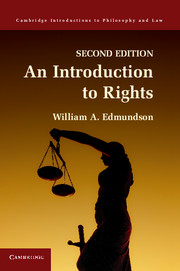Book contents
- Frontmatter
- Contents
- Preface to the First Edition
- A Note on the Second Edition
- A Note on Citation Form
- List of Tables
- Part One The First Expansionary Era
- Part Two The Second Expansionary Era
- 6 The Universal Declaration, and a Revolt Against Utilitarianism
- 7 The Nature of Rights
- 8 A Right to Do Wrong? Two Conceptions of Moral Rights
- 9 The Pressure of Consequentialism
- 10 What Is Interference?
- 11 The Future of Rights
- 12 Conclusion
- Bibliographical Notes
- References
- Index
10 - What Is Interference?
from Part Two - The Second Expansionary Era
Published online by Cambridge University Press: 05 June 2012
- Frontmatter
- Contents
- Preface to the First Edition
- A Note on the Second Edition
- A Note on Citation Form
- List of Tables
- Part One The First Expansionary Era
- Part Two The Second Expansionary Era
- 6 The Universal Declaration, and a Revolt Against Utilitarianism
- 7 The Nature of Rights
- 8 A Right to Do Wrong? Two Conceptions of Moral Rights
- 9 The Pressure of Consequentialism
- 10 What Is Interference?
- 11 The Future of Rights
- 12 Conclusion
- Bibliographical Notes
- References
- Index
Summary
Our concept of rights, properly speaking, first showed itself in history only when people began to distinguish between what is right in a general sense and what is right with respect to a certain person. This distinction is the one we marked by the unfortunately misleading terms “objective right” and “subjective right.” There is dispute about when in history this distinction began to be made, and whether in fact that moment has arrived at all in at least some non-Western cultures. This possible historical and cultural variability feeds the worry about relativism – that is, the worry that rights may not be universal after all, at least not unless they are imposed on all the globe (a means that may raise a related worry about imperialism).
But the conception of subjective right, although necessary, does not exhaust what many believe to be the essential nature and contribution of the concept of rights. Practically everyone agrees that the vigor and interest of rights rests in the correlative duties they entail. As we noted in Chapter 5, Hohfeld’s analysis of rights and their logical relationships does not make anything of the distinction between duties of non-interference and duties that such-and-such be the case. Hohfeld’s framework thus does not build-in what many have felt to be the essential function of rights – that is, to protect a sphere of individual liberty from interference, particularly by the state and its agents. If it all comes down to some duty that such-and-such be the case, then the distinctive contribution of the concept of rights has been lost, at least on this view.
- Type
- Chapter
- Information
- An Introduction to Rights , pp. 131 - 139Publisher: Cambridge University PressPrint publication year: 2012

